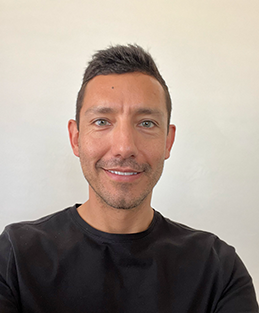My Account Details
Segmentation Strategy in the Age of AI Podcast and Transcript
This “Executive Perspective on Careers in Marketing” interview features Jaime Gaudet, Market Director at Aflac. On this episode of the Marketing Insights Podcast Series, Dr. Shane Hunt of Idaho State University visits with Jaime to discuss segmentation strategy in the insurance industry and the impact of AI and technology advances on AFLAC. Tune in for insights and career advice that will certainly inspire your creative and marketing strategy skills!
Full Episode Transcript
Shane Hunt:
Hello everyone, and welcome to this edition of the Marketing Insights Podcast. I'm Shane Hunt, Dean of the College of Business and Michael C. Rutgers Professor of Marketing at Idaho State University. And I'm thrilled today to visit with my guest, Jamie Gaudet, who's a market director at Aflac, one of the great companies in the world.
Jamie, welcome to the show.
Jamie Gaudet:
Thank you, Shane. I'm so excited to be here. This is my first podcast.
Shane Hunt:
Well, Jamie, we are thrilled to have you on the best podcast to start with, and Jamie has been an executive that we have profiled in our textbook, and I wanted to take some time, Jamie, because Aflac, a lot of people know Aflac, they know the duck. I won't, because this is being recorded, do my version of the duck voice, but they're very familiar with that. But I want to just talk about, because Aflac is such a well-respected brand and well-respected market leader, I just wanted to talk about a few things that I think will be beneficial for students.
The first is, Jamie, we talk in marketing classes and in principles of marketing about market segmentation, and I always think it's interesting to ask executives at companies like, how does market segmentation actually impact your company? So let's start with that. In your role as a market director for Aflac, how does market segmentation play into that strategy, into those decisions?
Jamie Gaudet:
I love that, Shane. So a little bit about Aflac, so you get some context to our market segmentation is we are a supplemental insurance company. The largest in the world. One and two families in Japan have us. So we're big across the United States and internationally. And what we do is we provide cash benefits to those people who have our coverage, who need us for cancer, for accident, for disabilities and so forth. So we are providing benefit packages to businesses. So that's what Aflac does in a very summarized nutshell, if you will.
For market segmentation what we look at as a company, so we have something called Aflac Workforce Report, and they put out this national database of research every year, and it's on market segmentation specifically. So it goes through and not only for our internal people at our company, but also for external for companies. We can go into a company, let's say it's a construction company, I'll have some research and data behind construction companies that I'm able to talk to them and make sure we are providing what their needs are or an education like a university. We know what some of their main needs are based on research. And then we also do market segmentation based on size. So the smaller the company we know there's certain needs, larger company. So Aflac does that constantly. Is there anything that you want me to dive deeper into on that?
Shane Hunt:
No. I think that's great, Jamie. I think it's just something where we want students to understand it's across industries because we don't know necessarily when a student's studying that and seeing that. And that segmentation really, I'm guessing, like you said, because of market size or because of different variables, those segmentation things really drive your strategy and approach towards those organizations. Would that be correct as well?
Jamie Gaudet:
100% So we are constantly training, teaching, coaching to our agents that go out to companies like how to have that value prop conversation, how to ask the right questions because, again, we know certain industries have certain pain points, and knowing that whether you're in insurance or you're selling a widget or you're marketing cereal, whatever you're doing across the board, you have to know based on size of company, based on industry, what their pain points are. Because when you go in it's not about you. It's not about our insurance when we walk in. It is about that company and the needs they have and making sure I'm meeting their needs. And again, whether cereal, a pen or insurance, if I'm not meeting those needs and marketing and sales, then what am I doing? We should not be marketing or selling to anyone if we're meeting our needs and not theirs.
Shane Hunt:
That's such great advice for everybody that listens to this. Jamie, one of the things that, I mean, benefits are something that impacts almost everyone's life, and there's a lot of things both with that and with the shifts in the entire marketplace around technology and artificial intelligence. Can you talk a little bit about some of the things that you're seeing as far as technology in the benefit space and some of the impact that that's having?
Jamie Gaudet:
Yeah, it's interesting. It is a hot, hot topic right now, and it's going to become the thing as we continue to progress in the world, it is the thing that's happening. So with Aflac specifically how we're looking at technology, you're seeing technology and benefits.
One, you have AI and machine learning for claims. So you have an internal piece that when you look at administration and operations of any company, which if you're in marketing sales, you need to be on top of operations, administration, efficiencies because you're out marketing and selling something and you have to know the back end because that's what keeps the promise that you are selling or marketing to on a daily basis.
So AI internally is interesting in insurance, it makes people anxious. It's very interesting. So we're using a little AI and there's a lot out there about Aflac and insurance companies using AI, but we've not turned it on fully because it does make people a little anxious about what are we putting out into the universe, that is the internet, with this personal information. And so we are very, very controlled on how we use AI and technology internally with people's information, we take that very seriously.
From an outsider's perspective with technology for benefit. We are not having a single conversation, whether it's a three-man automotive shop or a 30,000 life, university or hospital system. We're not having a conversation anymore without technology in the middle of it. What we're finding is a lot of companies are still doing a lot on paper, and it's just wild that we're in 2025 and people are doing paper. But we're able to provide, at Aflac specifically, paid for resources with technology and it just makes people's life easier.
And again, whether it's benefits or cereal or a pen, you have to have that technology base. And we're literally using it on a daily basis where a year ago or two years ago, we didn't have to have it. We were able to sell and market without it, and now no one will speak to us. They speak to us about technology. Then the end of the conversation they say, oh, okay, so we have to do benefits. Benefits is such a secondary conversation, even though that's why we're there. And it goes back to value prop, market segmentation. Solving their pain point, which their pain point is paper administration, period. And it could be benefits, it could be payroll for what we do, solving that problem with technology. They're like, yes, yes, absolutely. We're a yes because you're solving our problem. Then, oh, so what benefits are we going to put in place? Whereas a year ago it was benefits and then we had these secondary conversations. It's been flipped upside down for sure.
Shane Hunt:
No, and I love that, Jamie, and I love how you made that point too, because I think sometimes we all struggle to think about it's in a certain industry or we think about technology specific things to one organization. As you said, whether it's benefits or cereal or higher education or healthcare, these are all rapidly changing things that we have to be aware of in order to, like you said, solve those pain points and meet customers where they are. Jamie, that was such a-
Jamie Gaudet:
It is.
Shane Hunt:
Go ahead.
Jamie Gaudet:
I want to say one more thing. Our consumers are different in today's world. I use this analogy a lot. When I go on Amazon, I don't have to have someone sitting beside me walking through purchasing something on Amazon or teaching me how. It's intuitive. Whether you're 5 years old or you're 105 years old, you know how to buy on Amazon, unfortunately, it's too easy. Again, and that's our consumer behavior. So consumers now expect whether I'm buying the wide range of things, especially benefits for us, they expect for it to be on their phone where I can go through it and make it efficient. That's just the consumers we have today.
Shane Hunt:
Oh, and I think that's a great point about consumer behavior. As people begin and enjoy using a certain technology or a certain tool in one space of their life, they're going to expect that same thing in other spaces. And I think that's a great point that some areas and some industries have been behind on that and they're like, well, people can use that when they shop or they can use this in different things. They've come to expect that across the board, and marketers have to be aware of that as they're trying to meet the needs of those segments.
Jamie Gaudet:
It is.
Shane Hunt:
It's a huge thing. Jamie, you're an inspiring person. I have heard you speak to and I've been inspired and I wanted to save some time at the end just to ask you this question. There's a lot of marketing students across the country that are going to listen to this podcast, and I wanted to ask, what would be your advice to them as they go through their program and as they begin their careers in marketing?
Jamie Gaudet:
I love that, Shane, and thank you for the compliments. I think we're all trying to figure out this life. So whether you're a 19-year-old student, a 40-year-old student, I've been doing benefits for 22 years. I don't have it figured out. I am trying on a daily basis to figure out how to adult. So I think we're all trying to figure it out, and it's sometimes intimidating and overwhelming to look at adults. You look at Dr. Shane Hunt, and you look at his resume and what he's done, and he's about to be a president of university, and the bar is so high, I will never fill those shoes. But at the end of the day, Dr. Shane Hunt, Jamie Gaudet are just people doing the best they can every day taking care of people.
So my advice to students would be follow your passion and figure out what brings you real joy. So a real quick summary of my story is I really thought I was going into medicine. I got a biology and chemistry degree. I took my MCATs, I did all the things I was getting ready for interviews when I kind of fell into Aflac. My passion was I thought was medicine. I thought that's what my passion.
As I really dug into when I was 21, 22, 23, my passion really was helping people. That's what I figured out. And guess what? I can really help a ton of people with what we do at Aflac through insurance. So I thought my path was medicine because that was my passion. But when I've really figured out what my passion was and how I could apply it in other parts of this world and all the companies that are out there. My son is dead set he's going to be in engineering. He's 20 years old. What we have figured out, peeling that back is he's a problem solver at his heart. What brings him passion is solving problems. It brings him so much joy.
So what we're having conversations with our 20-year-old is you love solving problems. If it's engineering, dude, I am all for it. But what if it's not engineering? What if there's another way for you to solve problems that's not engineering? So I think for the students listening, being open to getting outside of your dead set path, because I never dreamed as a small girl growing up with this type A personality that I would be in insurance for 22 years. It's crazy. No one dreams of going in insurance. But I literally change the world on a daily basis and I'm leaving a legacy that will last for generations, and that's what brings me deep joy.
So at the end of this is find what your deep joy is and know that there are different paths to achieving that deep joy and passion.
Shane Hunt:
I love everything about that, Jamie, and as the father of a recent college graduate who is a marketing major, as the father of a daughter who's a freshman marketing major right now, I could not agree more with what you said. Thank you, Jamie, for sharing your insights and sharing your time with all of us on the Marketing Insights Podcast.
Jamie Gaudet:
Thank you so much.
Shane Hunt:
And thank you all for listening, we'll see you next time on the Marketing Insights Podcast. Have a great day.


